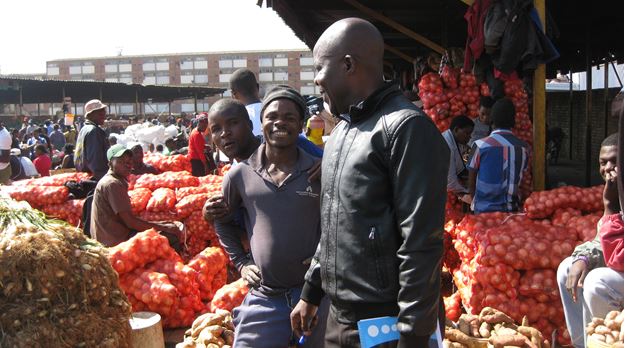One of the most seductive assumptions in African agriculture is that farmers and aspiring agricultural entrepreneurs can succeed through following a specific set of steps. However, as markets become highly networked and competitive, success no longer just depends on what a farmer or an entrepreneur does but on the actions of rivals or competitors. Unless they cultivate a global mindset, farmers and entrepreneurs in developing countries will continue to over-simplify agriculture by thinking it is a straight forward undertaking with obvious results.

Dynamics of a free-market economy
Key elements that drive performance in agribusiness are now beyond the control of farmers, traders and other value chain actors. That is why farmers may never achieve success simply by following certain steps prescribed by input companies or extension officers. In the prevalent free-market economy, competition and imitation is leading to a decline in profits. For instance, the more farmers get into producing a commodity, the less income is shared among farmers. Unfortunately, in Zimbabwe, for instance, tobacco farmers want more money each year irrespective of the effects of more farmers joining the tobacco production band-wagon every season. As more farmers start producing a particular commodity, they copy each other’s winning ways and diffuse best practices.
In many developing countries, domestic horticulture has shown that farmers and value chain actors who enjoy long-term success do so through a number of innovations such as stringing together many short-term successes unlike trying to look for elusive secrets to success. This is contrary to a tendency by development interventions and formal contractual arrangements to mislead smallholder farmers into believing that following a few key steps will inevitably lead to success without influence from external factors. As a result of these misconceptions, many farmers call eMKambo looking for a formula that can be easily applied in order to earn high income from agricultural activities. Some of the famous questions include: Which crop can I grow to earn more income? Our usual answer is that there are no guaranteed keys to success in agriculture because a lot depends of competitors, mostly unknown to farmers until they get into the market.
Limitations of searching for certainty
Rather than search in vain for success formulas, eMKambo always encourages farmers and other value chain actors to adjust their thinking and recognize the fundamental uncertainty of the agribusiness world. A majority of farmers have been schooled into believing that agriculture and related businesses can be made predictable so that specific actions lead to certain outcomes. The reality is that agriculture is now largely about making choices and decisions under uncertainty. For instance, it is difficult to accurately know whether consumers will embrace or reject your commodity. Actions of competing farmers and food producers are often fluid and unknown.
Empowering farmers through evidence and a global mindset
African agriculture is becoming more about odds, chances, and trade-offs than abundance of natural resources. Faced with uncertainties of the agricultural sector, especially markets, wise farmers and value chain actors have to invest in gathering accurate information and subjecting it to careful scrutiny in order to improve their odds of success. While greater knowledge and understanding is critical, good decisions do not always lead to favorable outcomes, and unfavorable outcomes are not always the result of poor decisions. Agribusiness is no longer a place of clear causal relationships, where a given set of actions leads to predictable results, but one that is more tenuous and uncertain. That is why farmers and agricultural entrepreneurs should gather appropriate information, evaluate it thoughtfully, and make choices that provide the best chance for success, while recognizing the fundamental nature of uncertainties surrounding agricultural economies.
Rather than expecting every smallholder farmer to travel around the globe understanding international markets, it should be the role of educated people in developing countries to cultivate a global mindset in their local communities. How do educated Africans and those toying with technology help farmers so that they don’t continue wasting their capabilities by producing more than the local market can absorb? How can technology enable marginalized people to reach various parts of the globe without physically going there? The informal market constantly challenges leadership and intellectual skills through presenting models cultivating and utilizing global mindset. Farmers who frequent informal markets always express the following attributes and competencies that exemplify a global mindset:
- A strong desire and resilience for working cross-culturally.
- Thorough understanding and knowledge of other cultures.
- Careful choice of the correct verbal and non-verbal actions in unfamiliar circumstances.
The genesis of a global mindset is when communities celebrate diversity and reward culturally intelligent behavior. While local people embrace both external and local commodities, to become smart consumers, they need capacity building. When a global mindset geminates, a farmer can be able to connect his resources such as land, curiosity, water and labor with the globe. Empowering farming and rural communities with a global mindset is like giving them a key out of poverty because they will become confident knowledge seekers. Farmers should be wise enough to constantly look for independent evidence rather than merely accepting ideas from their associations or peers as the only gospel truth. Decisions must not be entirely based on data contaminated by their biases.
charles@knowledgetransafrica.com / charles@emkambo.co.zw / info@knowledgetransafrica.com
Website: www.emkambo.co.zw / www.knowledgetransafrica.com
eMkambo Call Centre: 0771 859000-5/ 0716 331140-5 / 0739 866 343-6
